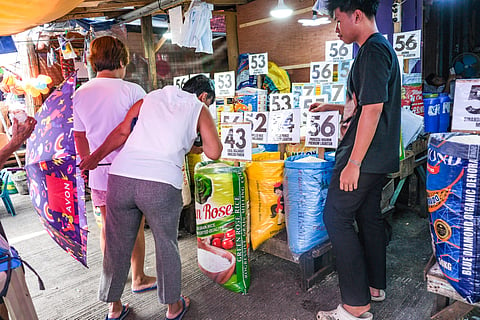
- NEWS
- the EDIT
- COMMENTARY
- BUSINESS
- LIFE
- SHOW
- ACTION
- GLOBAL GOALS
- SNAPS
- DYARYO TIRADA
- MORE

Rice could still be sold at P20 per kilo once the agricultural sector and the cost of production return to normal, President Ferdinand Marcos Jr. said on Tuesday.
Marcos told reporters in Zamboanga that several factors, including natural calamities, reduced yields, and global events, have resulted in rice prices rising, forcing his administration to impose a price cap.
"There's always a chance that if we improve our production and make it efficient, we won't be greatly affected by storms, and the assistance we provide to farmers can be put to good use," he said.
"When we lower the cost of production, the price of rice will also decrease. Everything will go down as well. As long as we have a higher yield, we can cut the prices," the President added.
Bringing down the price of rice to P20 per kilo was Marcos' campaign pledge, something he said he remains optimistic about as government moves to optimize the value chain for the commodity.
The value chain for rice production comprises all the activities in bringing rice from the farm to the consumer. It involves a variety of stakeholders, including farmers, input suppliers, millers, traders, retailers, and consumers.
"We set a price cap. We told everyone not to… for consumption. I said, don't buy above the price cap because they shouldn't sell beyond the price cap," Marcos said. "We're always looking at it, not just because we always talk about improving the farmers' production."
Marcos said he increased the purchase price of palay or unmilled rice to support farmers and to ensure that there will be enough rice to meet the country's needs.
He said the Philippines faces several challenges, including the El Niño phenomenon, which could lead to drought and reduced rice production.
"We see that when El Niño arrives, there might be drought, and the harvest won't be good because there won't be enough rain," he said.
"That's why all the different Asian countries are making sure they have reserves, they have buffer stocks. And that's why they're all competing," he added.
Marcos also warned that the government would continue to crack down on illegally imported rice.
He made the statement as he oversaw the distribution of 1,500 sacks of confiscated smuggled premium quality rice to Pantawid Pamilyang Pilipino Program (4Ps) beneficiaries in Zamboanga City.
The distributed rice was a portion of the 42,180 smuggled rice sacks worth P42 million seized by government officials on 15 September from a warehouse in Barangay San Jose Gusu, Zamboanga City.
Marcos said the illegally imported rice was seized because the warehouse manager could not say where the rice came from and where the tax and tariff payments were made.
"These are the ones that were apprehended; these are the ones who recently purchased NFA during this season. So, as you can see, we will fill up this warehouse, and we will increase it. We will make the buffer stock larger to somewhat mitigate the price increases," Marcos said.
"We need to tighten surveillance on illegally imported smuggled rice… and with our counterparts at Customs, do not allow any smuggled rice to enter," he added.
